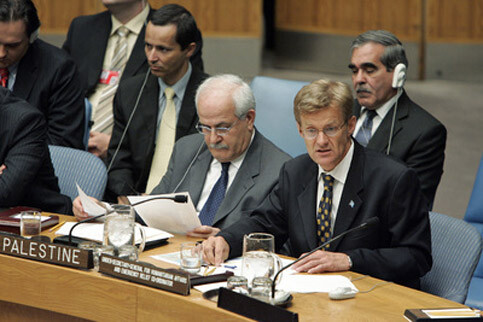United Nations News Service 22 July 2006

Jan Egeland (right), Under-Secretary-General for Humanitarian Affairs and Emergency Relief Coordinator, addressing the Security Council at UN Headquarters in New York. (UN Photo/Paulo Filgueiras)
As the death toll in Lebanon surpassed 350, including large numbers of children, the United Nations Emergency Relief Coordinator headed to the country as part of his bid to facilitate ‘humanitarian corridors’ to allow relief aid to reach besieged residents, while UN agencies worked to shore up their own aid efforts.
Jan Egeland is expected to meet with senior members of the Lebanese Government and with the newly-established High Relief Council, as well as with the UN country team and other United Nations representatives, including the UN Interim Force in Lebanon (UNIFIL), the UN Office for the Coordination of Humanitarian Affairs (OCHA) said today.
“During his visit, he expects to survey sites that have been identified as part of the proposed humanitarian corridors for the international relief effort in Lebanon and other areas that have been affected by the conflict,” OCHA said.
According to the World Health Organization (WHO), more than 350 Lebanese have been killed and more than 1,000 injured. An estimated 34 Israelis have been killed and 200 wounded. WHO also estimates some 600,000 displaced people in Lebanon.
Bombardment by the Israeli Defence Force has caused widespread damage to bridges and roads, hospitals, schools, residential housing, electricity plants, airports and seaports, especially in southern Lebanon, and OCHA warned that fuel shortages are looming. Three main hospitals in southern suburbs of Beirut were not operating today, WHO said.
Civilians in parts of southern Lebanon are cut off due to the damage, and the UN has been unable to move relief supplies into and within southern Lebanon due to the destruction and security concerns, OCHA said. The UN will launch a Flash Appeal for humanitarian assistance in New York and Beirut on Monday.
The UN High Commissioner for Refugees is monitoring countries surrounding Lebanon for refugee outflows and assessing needs in-country of those displaced, while stockpiling goods in Jordon and Syria. The UN Children’s Fund (UNICEF) has started using tankers to supply clean drinking water to public buildings housing internally displaced persons (IDPs). The agency is also providing water purification systems, soap and oral rehydration salts with plans to send two planes of relief items to Beirut over the weekend.
The UN World Food Programme (WFP) estimates sufficient food supplies in Lebanon for up to three months, but has concerns about disruptions to food supply chains, as well as safety of relief convoys. Emergency staff from WHO are undertaking health assessments and monitoring health threats. Many non-governmental organizations (NGOs) are delivering lifesaving assistance to populations with critical needs in Lebanon.
Mr. Egeland, during an official tour that runs through Thursday, will travel to Israel after launching the Flash Appeal on Monday. He is expected to meet with senior members of the Israeli Government and representatives of the Israeli Defence Forces, as well as with the UN country team.
From there, he intends to undertake a visit to the Gaza Strip, where he will meet with the UN Relief and Works Agency for Palestine Refugees in the Near East (UNRWA) and others involved in humanitarian relief.
Related Links